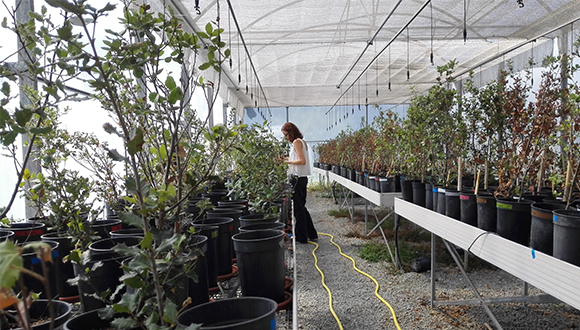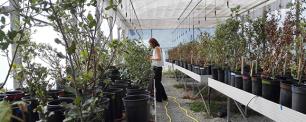Catherine Preece: “It is possible for women to work in science, but there are still barriers”
We interview Catherine Preece, PhD in biological studies and specialist on sub-arctic vegetation. Dr. Preece carried out her first post-doc at the University of Sheffield on agriculture-related themes. The Marie Curie grant awardee is currently doing her second post-doctoral stay in Catalonia, where she is now focusing on drought effects in Mediterranean forests. Our conversation covered a number of topics, including: what is the role of climate change? What does the future hold for our forests, and how can we contribute to their conservation?

To start, what are you working on right now?
In very broad terms, I’m interested in knowing more about the effects of drought on plants in Mediterranean soils. In order to study this, I began an experiment with holm oaks last year. The study is also related to climate change because we manipulate the amount of water the plants receive in order to simulate different drought levels. This way, we can see how the plants, soil bacterial community, and soil micro-fauna respond.
What is the intention of subjecting plants to different amounts of water?
This kind of experiment is very useful for a couple of reasons. First, it helps us see better how water deficit (stress) affects the plants. Also, we can detect the exact point at which the stress from lack of water is too much for the plants to handle, compromising their ability to return to their original state.
How can we tell if a plant lacks water?
There are many ways. One of them is by the color of the leaves because in drought they become brown. For a more scientific evaluation, you can quantify the amount of chlorophylls in the leaves, the rate of photosynthesis, or the activity of the soil-plant system. If the root system is active this means that the plant will be better able to recover when water becomes available again.
What is the relevance of this project to society?
Generally speaking the tree species we study are very common in the Mediterranean, and particularly in Catalonia. It is useful to understand how increasing droughts will affect these species because it is expected that in years to come droughts will become an even greater problem. Understanding the effects of drought on common species helps us predict potential problems for the forests.
What action can individuals take to mitigate the effects of drought in the Mediterranean?
Land and forest owners should take better care of the soil because, sometimes without knowing or understanding, they damage it physically, introduce animals that shouldn’t be there, irrigate either too much or too little, etc.
For the rest of us, there are many decisions we make which are related to climate change. For example, it is important to use water in a sustainable manner since as I said before it is predicted that droughts will become worse and worse. It is normal that there is some drought in summer, but not at the levels that are predicted to occur.
Is this project useful for predicting what may happen in the future?
With the results of this experiment we will be able to establish what drought levels will be dangerous for forest species. Therefore, it will also help us be more prepared for what may happen and also to preserve Mediterranean ecosystems.
On a more personal level, you are a recipient of the prestigious Marie Curie grant: why did you choose to come to Catalonia and what were the requirements?
I wanted to live and work in a different country and this grant was the perfect opportunity to make that happen. I was excited to come to CREAF. The requirements (laughs as recalls) were a large application of more than thirty pages. I had to think very carefully about what kind of experiment I wanted to do, the questions I was going to answer, and why this was the best place to do it.
And so why did you choose CREAF?
I’m working with Josep Peñuelas. I had heard of him before because he’s very good on themes related to climate change and particularly soils. I was a plant ecologist at the University of Sheffield and I wanted to know more about the relationship between plants and soil and I knew that a group at CREAF worked precisely on this topic. I also wanted to live in Catalonia, I had visited Barcelona before and I’d loved it.
Finally, as a woman, there is a question that I should ask you. What do you think about the relationship between women and science? Especially since you mention Dr. Peñuelas, a man, as an important reference.
This is an issue that I have also been interested in because at my last post-doc there weren’t many female professors, or even PhD students for that matter. I thought to myself, “what is going on here? Is it really so impossible to be a woman in the scientific world?” My conclusion is no, I don’t think so, but I do think that there are certain barriers. Researchers have to be constantly publishing articles, travelling to events, and moving around for their studies. This is difficult when one has a family. Traditionally, it was thought that women should follow men wherever they go. This needs to change.
Also, when you have a child you need to stop your work activities for a year or two and its difficult to reintegrate into academia. Fortunately, there is increasing facilitation for career pauses and to be able to return to research later. This kind of thing is becoming more flexible, and considering the role of women is important.







